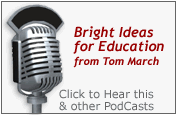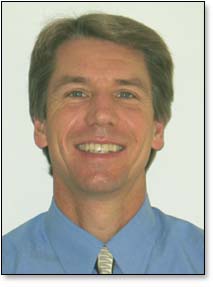"Weighing-in on Wikipedia"
a primer as the dust begins to settle You may have heard a buzz across the popular news media recently about a Web site called Wikipedia. Most likely it was portayed one of two ways: 1) "How did they ever think that would work!" or 2) "Look what People Power can do!" Like most mass media alerts, it's the simplified, extremist angle that "sells," but the truth often sits somewhere in between. While this column won't claim rights to truth, looking a little closer at the issue should help educators, parents and students.
You may have heard a buzz across the popular news media recently about a Web site called Wikipedia. Most likely it was portayed one of two ways: 1) "How did they ever think that would work!" or 2) "Look what People Power can do!" Like most mass media alerts, it's the simplified, extremist angle that "sells," but the truth often sits somewhere in between. While this column won't claim rights to truth, looking a little closer at the issue should help educators, parents and students.
a bit of background
So what is Wikipedia and what's the big deal? The site's tagline is "Wikipedia: The Free Encyclopedia." The idea is that if people could pool all they know, wouldn't that make a fantastic knowledgebase? Before the Web, the closest we could come to this dream were the massive volumes of encyclopedia. But given Internet access around the world people could share what they know. And what if the means to do this were so simple anybody could? Welcome to Wikipedia.
To quote from the site itself:Begun in 2001, Wikipedia has rapidly grown into the largest reference website on the Internet. The content of Wikipedia is free, written collaboratively by people from all around the world. This website is a wiki, which means that anyone with access to an Internet-connected computer can edit, correct, or improve information throughout the encyclopedia, simply by clicking the edit this page link.
trouble in paradise
 The word wiki itself comes from a Hawaiian expression "wiki-wiki" meaning "quick" or "fast" which highlights the speed of posting an article right from any Web browser. How has it been going? Here are two indicators: Alexa ranks it as the 17th most visited site on the Web and it recently celebrated a milestone by posting over one million articles in English. Clearly the experiment has been a success in terms of numbers. Still, it doesn't take a genius to reckon, "Hey, you mean anyone can write on it?! Like goofy stuff, too?!" And so they do. And someone did. The media scrum began when an article claimed that a former aide to Robert F. Kennedy might have been involved in the assassinations of the Kennedy brothers. This gentleman saw his name in the article and rightly felt an injustice had been done. Although Wikipedia had been in the news many times before, this time it must have been a quiet days on the wires...
The word wiki itself comes from a Hawaiian expression "wiki-wiki" meaning "quick" or "fast" which highlights the speed of posting an article right from any Web browser. How has it been going? Here are two indicators: Alexa ranks it as the 17th most visited site on the Web and it recently celebrated a milestone by posting over one million articles in English. Clearly the experiment has been a success in terms of numbers. Still, it doesn't take a genius to reckon, "Hey, you mean anyone can write on it?! Like goofy stuff, too?!" And so they do. And someone did. The media scrum began when an article claimed that a former aide to Robert F. Kennedy might have been involved in the assassinations of the Kennedy brothers. This gentleman saw his name in the article and rightly felt an injustice had been done. Although Wikipedia had been in the news many times before, this time it must have been a quiet days on the wires...
Now everyone had to take a side. In education, it was usually the librarians in one corner and learning-centered libertarians in the other. To grant each their due, more than other educators, librarians are charged with providing access to information. And information that's inaccurate is misinformation. How frustrating it must be to want to coach students toward truth and see them return with reams of text copied from the Internet! On the other hand, teachers who are passionate about helping students think for themselves, see the unreliability of sources like Wikipedia (and Web pages, magazines, books, etc.) as a rich learning opportunity.
Nature steps in
Wikipedia's credentials received a boost late last year when Nature magazine published "Internet Encyclopaedias Go Head to Head". The Nature journalists organised an expert-led investigation using peer review to compare Wikipedia and Britannica's coverage of science. The bottom line:
The exercise revealed numerous errors in both encyclopaedias, but among 42 entries tested, the difference in accuracy was not particularly great: the average science entry in Wikipedia contained around four inaccuracies; Britannica, about three.
Coming from such a respected source, this would seem to settle the debate, but a little sleuthing by blogger Nicholas Carr revealed that "the survey probably exaggerated Wikipedia's overall quality considerably." Carr actually read (imagine!) supplemental documents provided by Nature and emailed the article's author and found that
"The article appeared in the news section and is a piece of journalism, so it did not go through the normal peer review process that we use when considering academic papers."
coming to terms with a changing world
So where does all this leave us teachers, parents and children who need to "take a stand" on Wikipedia and whether it should be used? I like to think it puts us right in the thoughtful middle ground. What we choose as learning resources should correspond to what we hope to learn. If we want to get the big picture of what most people think about a subject, Wikipedia's a good choice. Especially because "Wikipedians" acknowledge when a subject is controversial or potentially biased by the Web-user demographic. If we are interested in current events, Wikipedia's more up-to-date than a print encyclopedia. If we're after the kind of details publishers wouldn't bother to print, again, someone might have posted it on Wikipedia.
On the other hand if we want to find out the generally accepted perspective on a subject that is potentially more complete and likely better written, a print encyclopedia will be a better choice. In fact, reference books become ever more valuable in our Internet-info world: with the wealth of fringe opinions flying around, it's good to know what the broader middle ground thinks.
As for my perspective, it shouldn't be too difficult to read between the lines of this column to see that that I tend to favor anything that puts students in charge of their own learning. Using Wikipedia and the Internet in general accent one important fact: critical thinking that targets a more sophisticated personal understanding is the best resource a learner can have.
Finally, from an educator's perspective I find that the most interesting learning aspect of wiki software is when students don't download, but contribute. Wikipedia has gotten all the press, but the Wikimedia Foundation (its parent group) and other developers provide wiki software for free. This is an empty knowledgebase, just waiting for students to post what they have learned. Though not a new idea, it's one that needs a bit of shouting about to get above the noise of the popular press. A wiki can help leaners grow a body of knowledge, not just harvest the bounty of others' efforts. So let's keep open minds and learn as we go along.
Additional Links
- Wikipedia
- http://en.wikipedia.org/wiki/Main_Page
- Nature's article, "Internet Encyclopaedias Go Head to Head"
- http://www.nature.com/news/2005/051212/full/438900a.html
- Nature's supplemental information (word doc)
- http://www.nature.com/nature/journal/v438/n7070/extref/438900a-s1.doc
- Britannica's formal response to Nature's article (pdf)
- http://corporate.britannica.com/britannica_nature_response.pdf
- Nature's Response to Britannica
- http://www.nature.com/press_releases/Britannica_response.pdf
- Wikipedia's corrections of the errors found in the Nature study
- http://en.wikipedia.org/wiki/Wikipedia:Wikipedia_Signpost/2006-01-30/Errors_remedied
- Nicholas Carr's Rough Type blog on Wikipedia
- http://www.roughtype.com/archives/2006/02/community_and_h.php
- Wikipedia's guidance for contributing articles
- http://en.wikipedia.org/wiki/WP:BB
Get In-Person SupportTom March is a Web-based educator who lives in the Southern Highlands of New South Wales, Australia. He regularly consults with schools and educational organizations in Australia and the U.S. both in-person and online. He is available to work with local schools or at a distance via the Cutting Edge-ucator. Contact Tom on skype at tommarch or on email at tom@TomMarch.com. Upcoming Opportunities in the USTom is doing sessions at the NECC conference in San Diego and will also be available to work with others in the US from July 8th - 12th. Book now as this is first come, first-served and rates are reduced because Tom's already in the US. |
 |







